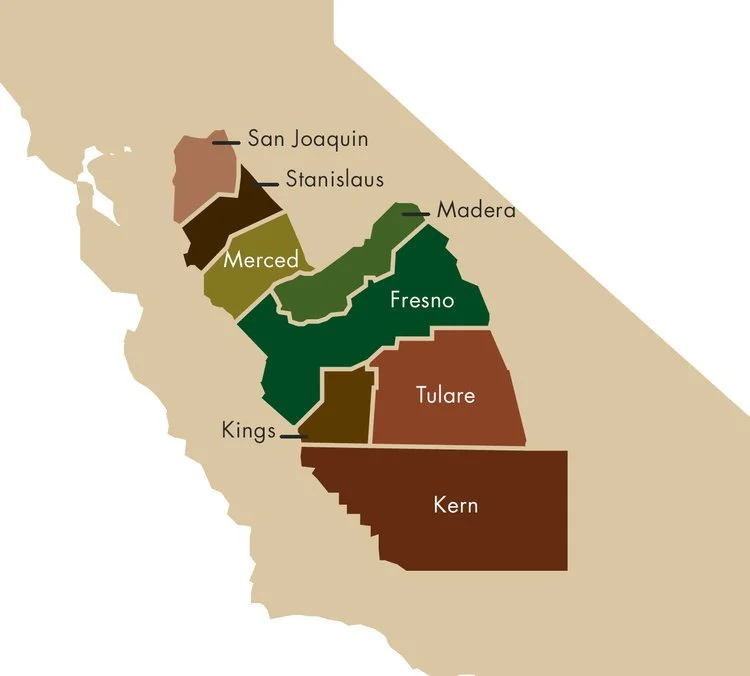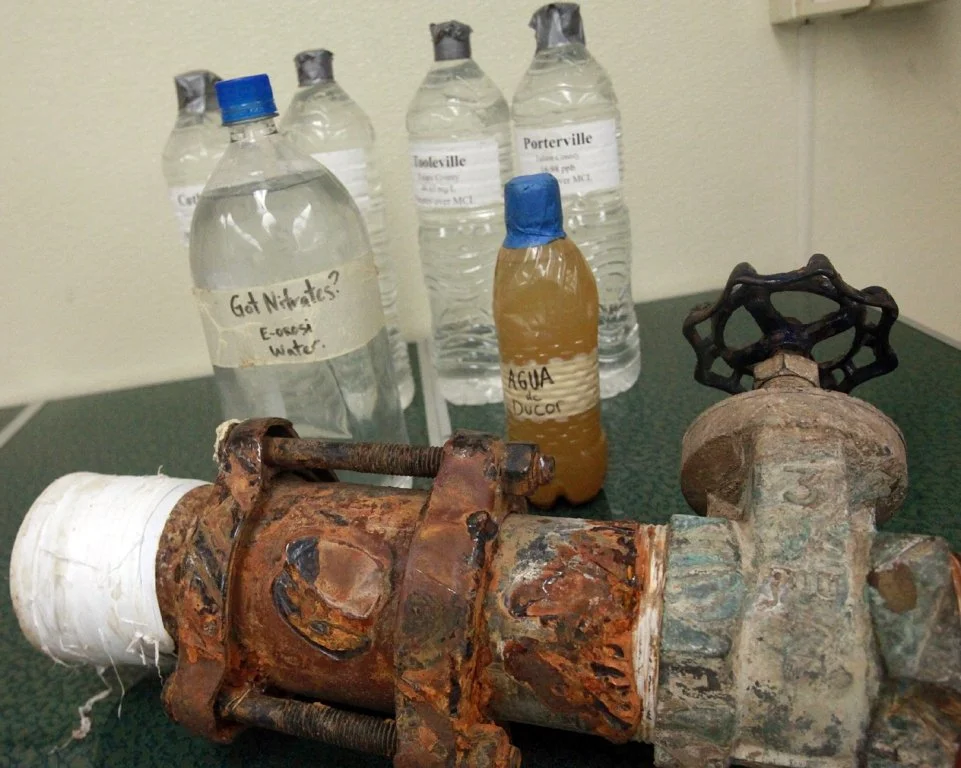Pursuit of Water Protection: Clean Water Access for Communities in the San Joaquin Valley
Shayla Chandler, Grant Program Associate
Flint, Michigan, gripped news outlets and drew attention to how administrative failures pertaining to water protection create irreversible harm. The outcomes of this crisis have disproportionately affected a predominantly Black and low-income community and shed a light on how the damaging effects of environmental racism will reverberate for generations. Although infrastructure improvements are currently underway in Flint, it took the city a shamefully long time to address the situation, even with all the heightened public attention. Unfortunately, this issue is not isolated to Flint, and other water injustices do not get the same level of attention. This lack of awareness not only exacerbates any delays in action, but also hides how close to home these issues are.
Protecting the right to clean drinking water is paramount for environmental justice. Water is essential for survival, and yet many communities are perpetually forced to navigate life with unsafe drinking water. Remedying this issue proves difficult as there are so many areas in which water protection can fail. The Clean Water Project has helped to bring these local water issues forward and aided the pursuit of water justice.
What Is the Clean Water Project?
The Clean Water Project served low-income unincorporated communities in California’s Central Valley.
A key piece of the fabric of our organization is our work to direct funding towards impact litigation that seeks justice for systemically oppressed communities. The Clean Water Project, which spanned our legal, training, and grantmaking programs, focused on bringing communities together to advocate for and gain access to potable water and on funding impact cases that address clean water issues faced by residents of unincorporated communities in the San Joaquin Valley in California.
The Impact Fund received funds for the project from the State Bar of California, which distributed funds from the settlement of a class action against Bank of America for community redevelopment. Active for five years, the Clean Water Project supported cases fighting for transparency of groundwater pollution data, agricultural run-off, dumping of raw sewage, and unlined pits for wastewater and oil/gas disposal in communities in the San Joaquin Valley.
Grants Made
A total of $134,098 was granted to a variety of cases that all aim to eradicate the issue of unsafe drinking water plaguing disenfranchised communities in California’s San Joaquin Valley. Here are some cases we have been able to support:
$25,000 went towards a case brought by Animal Legal Defense Fund against Foster Poultry Farms for using unreasonable amounts of water in their manufacturing plant in Merced County, California. Although more conservative water techniques are available, the plant chose a process that used 4 million gallons (about 15,141,640 L) every day, in an area that is known for its water scarcity.
$13,665 was granted to Leadership Counsel for Justice and Accountability for bringing a case to support a Black farmer who was incorrectly charged by an irrigation district in Porterville for water he did not receive. The farmer did not even have the infrastructure necessary to draw irrigation water from the canal as the charges described. As a result, his private well went dry and forced him into debt. This is a problem facing many low-income farmers in the area.
$11,200 went towards a case brought by California Coastkeeper Alliance against the Sacramento Area Sewer District and the county of Sacramento for dumping raw sewage, ultimately contaminating the Delta, Sacramento River, and American River. This region consists of primarily low-income residents who rely on groundwater as their drinking water, which has been polluted due to contaminants from fertilizer and pesticides. There were almost 700 instances of the District dumping raw sewage since 2018. Raw sewage contains massive quantities of bacteria, viruses, and mold, which can cause significant health problems.
Case Outcomes
Most of the cases we supported are still ongoing; however, a few cases have concluded:
The nonprofit Clean Water Fund challenged two oil and gas management companies, Valley Water Management Company and Sentinel Peak Resources, for discharging carcinogenic Proposition 65 chemicals on site in their open unlined pits, which are the largest in the country. The facility was putting nearly 5 million gallons (about 18,927,050 L) of oil and gas wastewater daily in these unlined pits, threatening groundwater and air quality. The case concluded with defendants having to pay upwards of $650,000 in penalties and an agreement to cease discharging chemicals.
A case was brought by Leadership Counsel for Justice and Accountability along with residents against Fresno County for the county’s failure to identify infrastructure needs that affect drinking water quality. Farmworkers already face some of the worst housing conditions, often living in makeshift shelters such as garages, vehicles, and tents. The court found that the county had a mandatory duty to include an analysis of infrastructure needs in disadvantaged unincorporated communities. The county complied by completing an infrastructure analysis and updating it according to state law.
It is pertinent to note that these areas are predominantly populated by Latine individuals, which means like that of Flint, environmental racism is at play. The neglect of infrastructure negatively and disproportionately impacts the health and well-being of communities of color and those who are systemically vulnerable.
Where We Go from Here
We’ll continue to support disenfranchised communities in their fight to access to clean water.
Water quality must be prioritized like the human right that it is, especially for those who are the most disenfranchised. If it is not, people’s lives will remain endangered. Failures to ensure clean residential water must be addressed every time or the health and safety of vulnerable communities will suffer. When failures are not addressed by local governments or through administrative processes, litigation can be an important avenue towards justice. Although we have distributed all the Clean Water Project funds, the Impact Fund remains committed to funding environmental justice cases through our Just Earth program. We will continue to fund cases working to ensure that people’s right to clean water is protected.
Action Items:
Looking to get involved in the work? Here are some actions you can take:
Sign petitions! There are not any California petitions yet but be sure to be on the lookout.
Check out our Clean Water Toolkit! Email Luna Khalil for a copy.
Listen to people's stories! Watch this mini documentary from LCJA about lack of clean water access: Unlivable Oasis: A Family's Housing Struggle on the Front Lines of the Climate Crisis | KQED Arts.
Join the fight! Help us continue to meet the needs of communities seeking justice: make a donation.
Read some of our other clean water related blogs:
Keep up with the cases listed: sign up for updates!
Organizations funded by this project include:
California Coastkeeper | Twitter: @CA_Waterkeepers
Leadership Counsel for Justice and Accountability | Twitter: @LCJandAALDF
Animal Legal Defense Fund | Twitter: @ALDF
Clean Water Action | Twitter: @cleanh2oaction
Follow them on Twitter and stay informed!



